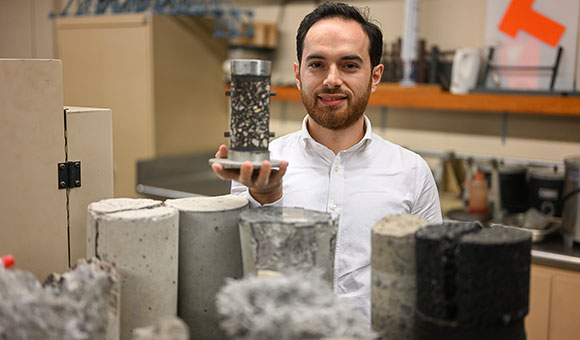SUNY Canton Assistant Professor Develops New Asphalt Test to Counter Cracks and Prevent Potholes
A SUNY Canton faculty member is implementing a new procedure to help paved surfaces withstand the tortures of traffic to prevent road fractures.
Assistant Professor Aksel Seitllari, Ph.D., who teaches in the Civil and Environmental Engineering Technology and Construction Engineering Technology programs, has developed a cyclic three-point bending or beam test to measure the material properties of asphalt accurately. It can determine how the pavement will react before it is used to surface roadways.

“By running this test in laboratory conditions, we can anticipate the behavior of asphalt material we put on the road after it is subjected to traffic,” Seitllari said. “The test is designed to help with reducing crack occurrence in asphalt pavements.”
His new, efficient method has caught the eye of Department of Transportation agencies in Virginia and Michigan. It has also received $130,000 in National Cooperative Highway Research Program’s Innovations Deserving Exploratory Analysis funding. Further, Seitllari has received an international standard from the American Society for Testing and Materials (ASTM D8458 – 22), which denotes the test’s ability to improve quality and enhance safety.
“The premise behind this test is to investigate the fatigue properties of asphalt mixtures to provide better insight into how pavement will behave under loading,” Seitllari said. “Fatigue properties of asphalt mixtures are important because they give a better insight into the anticipated performance of the pavement.”
Cracks caused by normal vehicle passes fill with water that expands and contracts with temperature changes. Those changes lead to larger sections of the roadways breaking free and causing potholes. Seitllari noted that extreme temperature changes and the use of snow removal equipment compound this problem.
Seitllari’s asphalt evaluation method has proven to be an advantageous laboratory testing alternative. The test uses a cylindrical sample clamped in two fixed points, and a central clamp applies a vertical load to simulate traffic. It is simple, practical, and cost-effective, requiring no cutting, gluing or other preparations.
“Fatigue in asphalt can be determined from our single test while factoring a combination of strain, temperature and frequency,” the assistant professor explained while holding an asphalt sample prepared as a test cylinder. “It also costs about 35% less than previous fatigue tests.”
The college is currently in the process of purchasing an asphalt mixture performance tester to aid in Seitllari’s research, according to Canino School of Engineering Technology Dean Michael J. Newtown.
“Dr. Seitllari’s innovation fits in well with the overall scope of what we do here at SUNY Canton,” Newtown said. “He has identified an area where he can apply his knowledge to generate significant and quantifiable improvement for the greater good.”
Seitllari first developed this innovative approach while earning his doctorate at Michigan State University, where he received guidance from Professor M. Emin Kutay, who has an extensive background in researching asphalt paving materials.
Discover SUNY Canton, where innovation meets opportunity. The college’s career-focused educational programs emphasize hands-on and applied learning opportunities in digital design, engineering technology, health, information technology, management, public service, and veterinary technology. Faculty members bring real-world experience and exceptional academic expertise to the classroom. As a leader in online education, SUNY Canton offers unmatched flexibility with hundreds of courses and 25 comprehensive degree programs offered completely online. The SUNY Canton Kangaroos compete at the NCAA Division III level and are members of the SUNYAC. In addition to its 15 traditional teams, SUNY Canton offers coed varsity esports and cheerleading.

